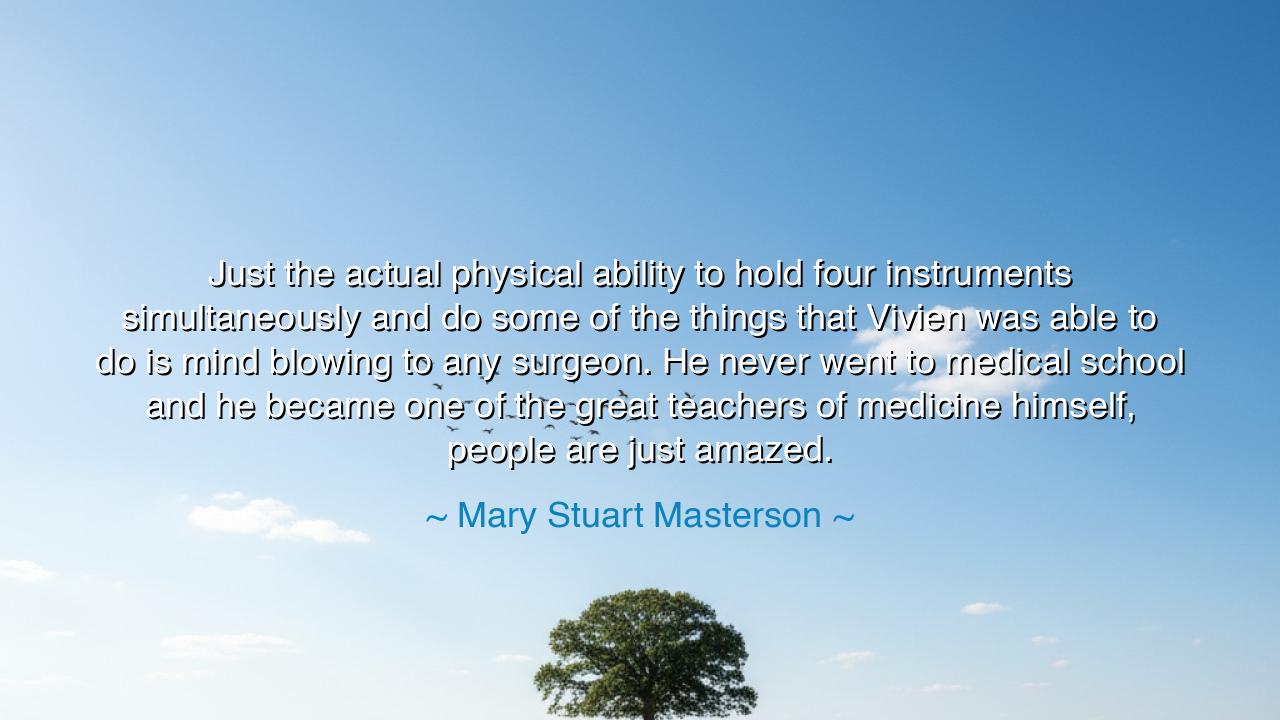
Just the actual physical ability to hold four instruments
Just the actual physical ability to hold four instruments simultaneously and do some of the things that Vivien was able to do is mind blowing to any surgeon. He never went to medical school and he became one of the great teachers of medicine himself, people are just amazed.






In the words of Mary Stuart Masterson, there shines a tribute to the triumph of the human spirit: “Just the actual physical ability to hold four instruments simultaneously and do some of the things that Vivien was able to do is mind-blowing to any surgeon. He never went to medical school and he became one of the great teachers of medicine himself, people are just amazed.” These are words spoken not merely in admiration, but in reverence — reverence for a man who defied limitation, who mastered a science he was never formally permitted to study, and whose brilliance illuminated an age clouded by prejudice. She speaks of Vivien Thomas, a name that ought to be spoken as the ancients spoke the names of heroes: with awe, gratitude, and humility.
The meaning of this quote lies in the recognition of greatness that transcends circumstance. Vivien Thomas, a Black man in early twentieth-century America, was denied the privileges of education and title that others took for granted. Yet he possessed the rare gifts of patience, precision, and intuitive genius — qualities that cannot be conferred by any diploma. Without formal schooling, he entered the laboratory of Dr. Alfred Blalock and, through tireless devotion, taught himself the intricate art of surgery. His hands, steady as divine instruments, performed feats that even seasoned surgeons found miraculous. He held four instruments at once — a symphony of motion, coordination, and insight — turning impossible procedures into elegant acts of healing.
The origin of Masterson’s words can be traced to her role in the film Something the Lord Made, a story based on the life of Vivien Thomas and his partnership with Blalock. Through her portrayal, she came to see not just a story of medicine, but a story of justice, perseverance, and genius denied yet undimmed. The film revealed to the world what history had long concealed — that the groundbreaking operation to cure “blue baby syndrome,” once attributed solely to Blalock, was born from Thomas’s ingenuity. When Masterson calls his skill “mind-blowing to any surgeon,” she speaks for generations of healers who, upon learning his story, bow in reverence before his brilliance.
In this, Thomas’s tale recalls the parables of the ancients, who spoke of men born in obscurity yet destined to touch the heavens. He is like Daedalus, the craftsman who built wings to defy the limits of the earth, or Archimedes, who, through understanding and persistence, moved the world. But unlike them, Thomas’s genius flowered in the soil of injustice. His achievements were not celebrated in their time; his work was the work of the unseen — a master who taught others, healed others, and made possible the survival of children he would never meet. And yet, he persevered, not for fame, but for the duty to creation itself — to the noble calling of healing.
The ancient philosophers would have called this arete — the excellence of the soul expressed through action. It is the highest form of virtue, born not from recognition but from the pursuit of perfection. Vivien Thomas embodied it. Denied the title of “doctor,” he became the teacher of doctors. Denied entrance to medical school, he transformed the very art of surgery. Such is the mark of greatness: to serve the truth of one’s craft with humility, to labor unseen yet leave a legacy that outlives injustice. His life reminds us that mastery is not granted by rank, but by devotion — and that the spirit, once awakened to its purpose, cannot be confined by walls of ignorance or prejudice.
History offers other mirrors of such courage. Consider Socrates, who had no written books, yet taught the greatest minds of Greece. Consider Harriet Tubman, who never held office, yet guided her people to freedom through knowledge of land and courage of heart. Like them, Vivien Thomas proved that wisdom and greatness arise not from privilege, but from unyielding commitment to truth and service. He transformed obstacles into instruments, injustice into opportunity, and, by doing so, became the very symbol of resilience.
The lesson of Masterson’s words is clear: never let the world’s limits define your reach. Titles may open doors, but discipline, curiosity, and integrity will break down walls. Do not measure your worth by credentials, but by the excellence of your deeds. Seek mastery not for praise, but because creation itself deserves reverence. And when faced with injustice, let your work speak — as Vivien Thomas’s hands spoke — in a language that transcends division, a language of purpose and grace.
So let these words echo through time: genius is not confined by institution, and greatness is not reserved for the privileged. Let every generation remember the example of Vivien Thomas — the man who, though denied a title, became a master; who, though unseen, reshaped the future. As Mary Stuart Masterson reminds us, his story is not only one of medicine, but of humanity — of the eternal truth that the light of talent, once kindled, cannot be darkened by any force of this world.






AAdministratorAdministrator
Welcome, honored guests. Please leave a comment, we will respond soon